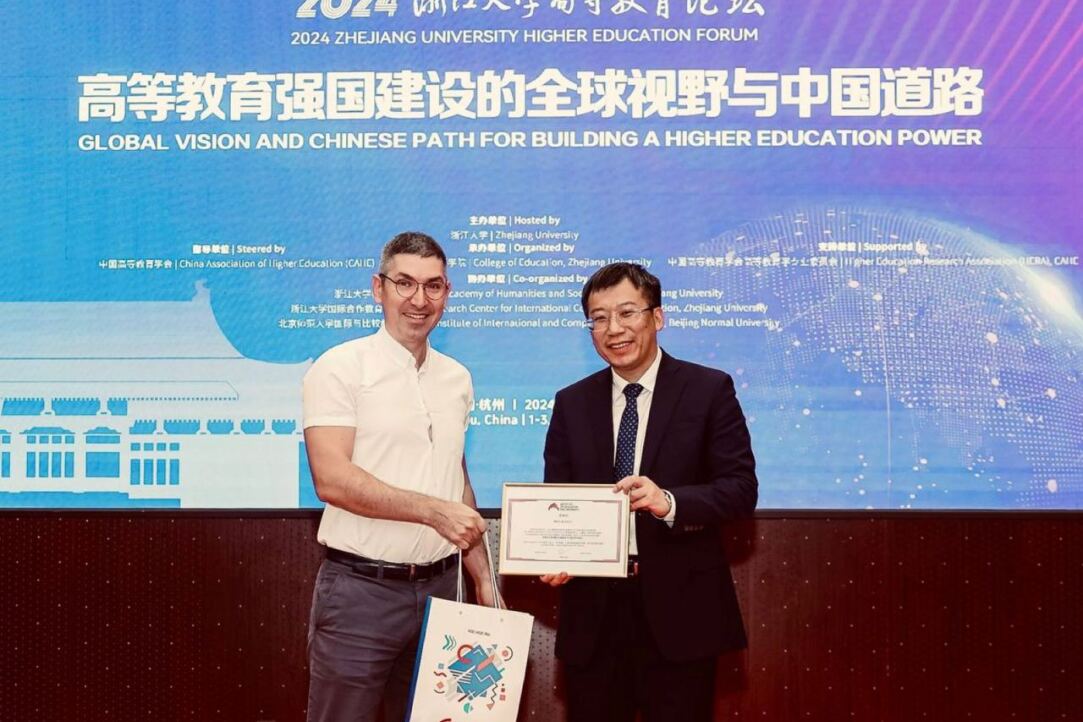ASSESS
The effects of reforms and policies in higher education
RESEARCH
The contribution of universities to socio-economic development
SUPPORT
The strategic development of universities and higher education systems
An Outline of Our Studies
-
CONTRIBUTIONS OF HIGHER EDUCATION
How higher education influences society and individuals. The contribution it makes to the economy, politics, culture, and public life both in Russia and abroad.
-
ACCESSIBILITY OF HIGHER EDUCATION
The specific factors that determine the accessibility of higher education. How the structure of the education system and changes within are related to the accessibility of educational opportunities. Comparative studies on institutional differentiation of higher education systems and educational opportunities in the tertiary sector.
-
EFFICIENCY, PERFORMANCE, AND IMPACT OF HIGHER EDUCATION INSTITUTIONS
Evaluation of the performance of universities. The effects of state reforms and context changes on the efficiency and effectiveness of universities. How university management affects performance.
-
HIGHER EDUCATION IN POST-SOVIET COUNTRIES
How the unified Soviet model of higher education has been transformed in 15 former Soviet countries. University research capacity in post-soviet countries: exploring policies and practices of research capacity development.
Consulting and Expertise
DESIGN
Strategies and development programmes for universities and their subdivisions, roadmaps for strategy implementation
FORMULATE
Development strategies for higher education systems in specific regions and industries
ANALYSE
The dynamics of university development using quantitative and qualitative research methods
DEVELOP
Various methods and opportunities for participation of higher education institutions in the socio-economic development of regions and cities
Research Projects
-
Data-driven governance: big data in analysing youth educational migration based on digital footprints
Research on the specifics, directions, and influencing factors of educational migration in Russia based on the digital footprints of young people
-
Production function of Russian HEIs: analysis of features, structure, and changes
Analysis of the internal process performance in HEIs, their changes and determinants. Analysis of HEI activity structure taking into account the heterogeneity of the contingent, their trajectories, and career expectations. Analysis of HEI performance factors in terms of students' educational success.
-
Educational success of Russian university students
Comprehensive analysis of the educational (non)success rate of students of Russian universities in terms of assessing the scale of success and unsuccessfulness and related factors. Development of proposals to improve the educational success rate of students.
-
Analysis of access to higher education and its relationship with interregional educational and labour migration of young people in the Russian Federation
Assessment of regional differences in the accessibility of higher education, identification of the causes and consequences of spatial heterogeneity. Identification of the relationship between the accessibility of higher education in the subjects of the Russian Federation with the normative provision of budgetary places and the consequences of educational migration of young people. Identification of regional groups by the level of access to higher education, the scale of youth migration, and the quality of admission to universities.
-
Institutional role of HEIs in shaping student trajectories
Analysis of institutional factors involved in the formation of educational migration flows of Russian youth. Analysis of the availability of educational opportunities and differentiation of educational and career trajectories. Analysis of student dropout predictors and the development of predictive models of attrition. Analysis of individual management practices in university performance.
-
Results of university activities and their contribution to social development
Generalisation and conceptualisation of the contribution of higher education in the perspective of social theories. Analysis of accessibility factors of higher education and educational achievements of university students. Analysis of the effectiveness of higher education institutions in Russia: the relationships between performance and efficiency indicators and managerial practices in Russian HEIs.
Commercial Projects
-
Campus concept development
Services of scientific and educational concept development in regards to the campus creation project in Petropavlovsk-Kamchatsky.
Customer: Kamchatka Institute of Education Development
-
Campus concept development
Development of educational and architectural-artistic concepts for the facility design: ‘Student Campus in the town of Tarko-Sale “Regional Centre for Personnel Training for the Fuel and Energy Complex”’
Customer: Department of Education of the Yamalo-Nenets Autonomous Okrug
-
Conducting a professional development programme
Educational services on a CPD programme ‘Management of higher education institutions in the context of the challenges in achieving national development goals.’
Customers: Transbaikal State University, Vitus Bering Kamchatka State University, Kabardino-Balkarian State University named after H. Berbekov
Educational programmes with the participation of laboratory experts
Team
Laboratory Head
Deputy Head, Chief Expert
Senior Research Fellow
Expert
Senior Research Fellow

Research Fellow
Junior Research Fellow
Analyst

Analyst
Research Fellow
Research Fellow
Junior Research Fellow
Senior Research Fellow
Research Assistant
Research Assistant
Research Assistant
Стажер-исследователь
Research Assistant
Research Assistant
Research Assistant
Publications
-
Book
Assessing the Contributions of Higher Education: Knowledge for a Disordered World
What is ‘higher education’ and what does it do for persons, organisations, communities, cities, nations and the world? What difference does it make? How do we know? While these questions and others related to the contributions or effects of higher or tertiary education are discussed across the world, there is no agreement on what are those contributions. The higher education sector is connected to most other parts of society, and it is often difficult or impossible to isolate its discrete causal effects. In some quarters a disabling thinking prevails. Higher education is modelled as if all that this vast sector produces is measurable earnings benefits for individual graduates and new research-based products for globally competitive industry. Yet graduate earnings are partly shaped outside education, by family background and economic fluctuations; and higher education not only augments careers, it immerses students in knowledge, and it helps to shape them as people, and has many other individual and collective-social outcomes, as Assessing the contributions of higher education will show. Still, the fact that radical simplifications dominate this debate is not surprising. It is difficult to grasp the full range of what the sector does. There is no universal template and no comprehensive account. Perceptions of what higher education is vary according to beliefs about government and society, and the disciplinary or purposive lens used to view the sector, not to mention the interests at stake. Is both a common and comprehensive understanding possible, and if so, how? That question repeatedly returns during this book.
Cheltenham: Edward Elgar Publishing, 2023.
-
Article
Universities’ internal governance and their efficiency: empirical evidence from Russia
This paper aims to assess the relationship between governance practices and the efficiency of universities. We use the conditional efficiency approach and a partial frontier approach (order-m estimator) for measuring universities’ efficiency and consider three important clusters of practices: centralisation, the growth of management teams at the administrative level and incentives for staff. The specific governance practices of universities are positively associated with their efficiency, the results differ for research-oriented and teaching-oriented universities. The optimal strategy for research-intensive universities would be to provide a reasonable level of autonomy and optimal investment in administrative support (administrative staff salaries), while possible recommendations for teaching-oriented universities include centralising some functions that reduce the administrative burden on the department.
International Transactions in Operational Research. 2024.
-
Book chapter
Specifics and Factors of Social Adaptation and Integration of Migrants in Russian Border Regions
The paper presents a theoretical and sociological analysis of social adaptation and integration of migrants. We turn to the classical model of acculturation, consider the types of adaptation, and focus on analyzing the essence of social adaptation to determine the processes of adaptation and integration of migrants. Recently, Russia has seen an increase in migration. The majority of migrants arriving in Russia are CIS citizens. We conducted several sociological studies and interviewed 449 foreign migrants in 2018–2019. The research results emphasize the integration tendencies of migrants. They strive to integrate into Russian society, obey laws, observe behavior rules, and honor values. Howey, they also continue to honor the traditions and values of their culture. We also emphasize the importance of migrants’ social capital. The presence of social connections and migrant communities determines migration and contributes to adaptation and integration. The factor model has shown that a considerable role in the social integration of migrants in Russia is played by (1) language proficiency, (2) the activities of public organizations to protect the rights of migrants, (3) the health of the migrants, and (4) relationships with the local population, in particular, colleagues and employers.
In bk.: Advances in Natural, Human-Made, and Coupled Human-Natural Systems Research. Vol. 234: Advances in Natural, Human-Made, and Coupled Human-Natural Systems Research. Lecture Notes in Networks and System. Iss. 1. Springer, 2023. P. 367-373.
-
Working paper
How Do The Characteristics Of The Environment Influence University Efficiency? Evidence From A Conditional Efficiency Approach
This paper explores the black box behind efficiency measurements in higher education and define the determinants of university efficiency. Particularly, it investigates how the efficiency of universities is affected by the characteristics of the territory in which they operate. We propose an analysis that combines two perspectives: 1) the resource dependence theory, suggesting that the location of university can determine the amount of resources available to it; 2) institutional isomorphism, according to which the characteristics of other higher education institutions located in the same area may shape the university production function and the efficiency of its operations. In order to test this framework we use the data on Russian universities and non-parametric conditional order-m efficiency estimator with two categories of exogenous variables. The first group includes the social, economic and cultural characteristics of the region where the university is located. The second set includes the characteristics of other higher education institutions located in the same region. Our findings highlight that the managerial efficiency of universities is strongly associated with the characteristics of the environment in which they operateEconomics/EC. WP BRP. Высшая школа экономики, 2020. No. 238.




















